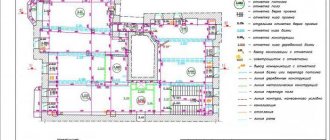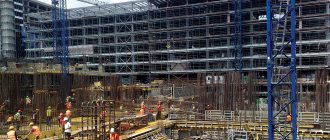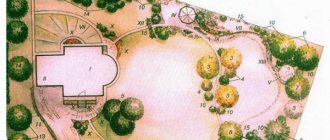When starting your own business, in most cases you have to rent a building or a separate small room.
Just the same area, which will be rented out and used by a person, is a free-use premises.
This is a type of commercial real estate, without which a small business would hardly develop.
What is a free-use premises, or it is also called PSN, and for what purposes is it used, we will understand in this article.
Legal aspect
Conducting one or another type of activity on the premises is regulated by relevant legislation. Thus, there are certain requirements for construction, operation, fire safety, sanitary and hygienic standards. The process of repurposing an object involves both external changes and internal re-equipment of the area for a specific type of activity. This task is implemented in accordance with the developed design, technical and inventory documentation. The main problems in determining the legal status of parts of a structure and non-residential areas are architectural diversity and the lack of specific rules for the circulation of this real estate.
Apartments from a legal point of view
However, no regulatory act on the “amnesty of apartments” has been adopted; a bill equating them to “housing” is promised to be submitted to the State Duma at the beginning of 2021.
It is not yet clear whether the construction of new apartments will be stopped or not.
Let's define what apartments are, they are also lofts and studios. And how do they differ from an apartment?
What are apartments
An apartment is a piece of real estate that can be either residential or non-residential.
In the current legislation of the Russian Federation there is no definition of the concept of “non-residential premises”, and even more so, the concepts of “loft”, “studio” and “apartment”.
However, the above concepts cannot be considered equivalent. In non-normative acts, the concept of “apartment” is used mainly in relation to hotel premises; the concepts of “loft” and “studio” are not mentioned anywhere at all; they are “colloquial” or “advertising” versions of apartments.
Therefore, in this article we will use the concept “apartment”, since this is what such premises are called in sales contracts related to their acquisition.
What is considered residential premises?
According to Part 2 of Article 15 of the Housing Code of the Russian Federation, an isolated premises, which is real estate and is suitable for permanent residence of citizens, is considered residential. This means that it must meet established sanitary and technical rules and regulations, and other legal requirements. That is, non-residential premises cannot be suitable for permanent residence of citizens, and therefore registration at the place of residence in them is impossible. Such premises do not meet the system of requirements that ensure the possibility of living in it.
Registration at the place of stay in non-residential premises is carried out only when the corresponding premises belong to a specialized institution, such as hotels, rest homes, hospitals; in other cases such registration in them is also impossible.
In fact, the owner will not be able to reside permanently in either the apartment, studio, or loft, although the legislation of the Russian Federation does not provide for any responsibility for permanent residence in non-residential premises owned by the right of ownership.
In addition to the differences in the technical requirements that apply to apartments and to non-residential premises suitable for temporary residence, the following differences between apartments and ordinary apartments can be identified, which are both positive and negative.
Positive differences between apartments and residential premises:
1. The cost of apartments is significantly lower than that of apartments of comparable size. At the same time, almost all apartments are sold with an open plan, which is attractive for those buyers who are ready to design their own housing, especially since the norms of housing legislation on the reconstruction and redevelopment of residential premises do not apply to non-residential premises.
The owner of a non-residential premises has the right to carry out work on redevelopment or reconstruction of the premises without the approval of state bodies and local governments, unless the corresponding work has signs of reconstruction.
2. You can not only live in the apartments, but also equip an office and indicate their address as a legal address. This feature makes the apartment a sought-after investment in large cities, where people tend to live closer to work, even in the same building as their office.
3. According to the provisions of Art. 123.12, 123.13, 123.14 of the Civil Code of the Russian Federation, owners of non-residential premises can create a partnership of real estate owners (analogous to a homeowners association) for joint ownership, use and, within the limits established by law, disposal of property that is in their common ownership or for common use, as well as to achieve other goals provided for by law.
4. Usually the developer invites the owners to enter into management agreements with the Management Company, which regulate the expenses of the apartment owner for managing the building.
5. The construction of apartments is faster than the construction of residential buildings, since the developer does not need to comply with all the numerous regulations necessary for the construction and commissioning of residential buildings.
There are also significant disadvantages of apartments and lofts
1. The costs of maintaining apartments are significantly higher than the costs of maintaining residential premises. The property tax rate for individuals in relation to non-residential premises is no more than 0.5% of their cadastral value, while the tax on residential premises cannot exceed 0.1% of their cadastral value. The cadastral value of non-residential premises can often be higher than that of similar residential premises. Currently, the Moscow Government is considering the possibility of lowering the tax rate for non-residential premises due to the increase in the cadastral value of real estate, but a final decision on this issue has not yet been made.
2. The burden of maintaining apartments is higher than that of apartment owners, since utility tariffs for non-residential premises exceed the corresponding tariffs for residential premises by up to 40%.
3. The ability of the owner of non-residential premises to use it in any way may be a disadvantage for the neighbors of such an owner. That is, some apartment residents can use them for living, and their neighbors can set up hostels and cafes in them, for example. There are practically no legal ways to prohibit your neighbors in non-residential premises from opening a hotel or hostel there.
4. Currently, residential premises under construction can only be purchased on the basis of an agreement for participation in shared construction.
You can also purchase apartments on the basis of other, including preliminary sales and purchase agreements, the terms of which are less favorable to potential buyers due to their absolute insecurity, since the legislation does not regulate the apartment market in any way, which is especially dangerous in our time, when developers are going bankrupt everywhere and more and more fraudulent schemes are being invented.
It should be noted that at the moment, as part of the bankruptcy procedure, not all courts consider it possible to recognize the right of ownership of non-residential premises in an unfinished building, since this possibility is not expressly provided for by law.
According to the Federal Law “On Insolvency (Bankruptcy)” dated October 26, 2002 N 127-FZ, all claims for recognition of ownership rights against a developer in respect of whom an arbitration court has introduced a monitoring procedure are considered as part of the bankruptcy procedure.
This means that once the monitoring procedure is introduced, it will no longer be possible to file a claim in a court of general jurisdiction at the location of the property. If the recognition of ownership of non-residential premises is refused, all premises will be transferred to the bankruptcy estate and sold during the bankruptcy process, and the buyer of the apartments can only demand the return of the money paid.
Therefore, even before the introduction of surveillance against the developer, it is necessary to have time to recognize the ownership of non-residential premises in a court of general jurisdiction in order to avoid a possible refusal to recognize the ownership right in an arbitration court.
5. In relation to the sale of apartments, it is practiced to conclude preliminary sales and purchase agreements, which have a number of nuances. This is due to the fact that a purchase and sale agreement can only be concluded for non-residential premises that have already been built and duly registered, and an equity participation agreement is simply not beneficial for the developer, since its conclusion is regulated in detail by current legislation, imposing certain obligations on the developer.
A preliminary agreement is not subject to mandatory state registration , like an agreement on shared participation in construction, therefore the same apartment can be “sold” under a preliminary agreement to several buyers, and this fact cannot be verified. In addition, when concluding a preliminary agreement, the developer is not required to enter into an insurance contract against failure to fulfill obligations to transfer the premises to the buyer.
Unfortunately, many preliminary agreements do not indicate the exact period when the main purchase and sale agreement must be concluded with the transfer of the premises to the owner, which is a big problem for potential buyers. Most often, this period depends on the registration of the developer’s ownership of the premises, that is, it is not a predetermined date, but depends entirely on when the developer submits the relevant documents to Rosreestr. Sometimes such agreements indicate a date no later than which the purchase and sale agreement must be concluded.
The legal consequence of not concluding a purchase and sale agreement before the expiration of the period specified in the preliminary agreement is the termination of the preliminary purchase and sale agreement, that is, the termination of the developer’s obligations to transfer ownership of the premises to the buyer, since in accordance with clause 6 of Art. 429 of the Civil Code of the Russian Federation, the obligations provided for by the preliminary agreement are terminated if, before the end of the period within which the parties must conclude the main agreement, it is not concluded or one of the parties does not send the other party an offer to conclude this agreement.
Therefore, in order to prevent the consequences of missing the specified period, an application for concluding the main purchase and sale agreement should be sent to the developer shortly before the expiration of the specified period. If, before the expiration of the period specified in the preliminary agreement, the purchase and sale agreement has not been concluded, and the application for the conclusion of the agreement has not been sent to the developer, the latter only has obligations to return the funds received, the right to recognize ownership of the apartment will be lost.
6. The procedure for converting non-residential premises into residential premises is quite complex. At the moment, the procedure and the list of documents required for this are described in detail in the Administrative Regulations for the provision of state documents, approved by Decree of the Moscow Government of October 27, 2015 N 692-PP.
Taking into account the above “disadvantages”, the high costs of maintaining an apartment, if you purchase it for further living in it, it makes sense, after all, to transfer it to the status of “residential premises”, which, however, will not prevent neighbors from renting out their apartment in quality of hotel rooms.
Real estate market
At the end of the twentieth century, there was a fairly rapid development of commercial activity. In this regard, the problem of a shortage of available non-residential space has arisen. At that time, the commercial property market was in its infancy. Subsequently, its development took place in two directions. In particular, the purchase of private residential premises, which were located on the first floors of buildings, was carried out. At the same time, new buildings were erected. The first option was considered quite simple, cheap and fast. New buildings required large investments. The time factor was also important. Nevertheless, practice has shown that it is new buildings that have begun to bring significant profits to the owners. Today there is an intensive development of the commercial real estate market, despite the fact that apartment buildings are being built more often. A fairly large segment of the market today is occupied by non-residential premises for free use. Next, let's find out what these objects are.
Transfer of premises as a solution to the problem
It should be noted that Part 2 of Art. 23 of the Housing Code of the Russian Federation establishes a list of documents required for the transfer of residential premises to non-residential premises. For this transfer, it is not necessary to obtain the consent of all owners of an apartment building, including in the case of redevelopment of the premises. However, if such a transfer is related to the reconstruction of the house, then it will be necessary to obtain the consent of all owners of the premises or a decision of the general meeting of owners of the premises in the apartment building.
To change the status of non-residential premises, it must be owned by the applicant and not be encumbered with anything.
Moreover, it must meet the requirements for residential premises, or there must be a technical possibility to bring the premises into compliance with the requirements established by Part II of the Government of the Russian Federation of January 28, 2006 N47 (as amended on March 25, 2015) “On approval of the Regulations on the recognition premises as residential premises, residential premises unsuitable for habitation and an apartment building in disrepair and subject to demolition or reconstruction”, SNIPs, Federal Law of December 30, 2009 N 384-FZ “Technical Regulations on the Safety of Buildings and Structures” and the provisions of the Housing Code of the Russian Federation.
What does “vacant premises” mean?
This term is used in the professional speech of realtors. What does “vacant premises” mean? This characteristic indicates the multifunctionality of the object. The intended purpose of the building, as a rule, becomes known already at the design stage. However, for the owner, the option of building a universal structure would be more profitable and expedient in an economic sense. In the future, it can be repurposed to suit tenant requirements. Thus, a free-use premises can become an office or a shopping center. Often such areas are occupied by enterprises in the household or social sectors.
What is commercial real estate?
All real estate is divided into residential and commercial. If the name of residential premises speaks for itself, then the definition and characteristics of commercial real estate are worth considering in more detail. In this article we will tell you what commercial real estate is, what categories it is divided into, consider real estate as a source of income and give useful recommendations when purchasing such properties.
Commercial real estate - what does it mean?
Commercial real estate objects are premises, buildings, structures and plots that are intended to generate profit by renting out or conducting business activities directly by the owner. The owner of a commercial property can be either a legal entity or an individual. The profitability of commercial real estate is the main criterion for its evaluation.
Main features of commercial properties
Profitability.
Real estate generates direct income in the form of rent or indirect income - used for the development of an enterprise.
Payback.
With proper investment, investments pay off on average in 7-10 years. After this period, commercial real estate begins to generate net profit.
Interesting! For comparison, let’s look at residential properties that do not make a profit, do not pay for themselves and undergo depreciation during operation - if the market situation is stable, they may lose value.
What applies to commercial real estate
Most people consider only retail premises - shops, stalls - to be commercial objects. However, this group includes a large number of different objects that differ in characteristics and scope of use.
Types of commercial real estate
Commercial real estate is classified according to its intended purpose. In accordance with this characteristic, all objects are divided into groups:
Source: https://zen.yandex.ru/media/id/5adeba2279885eadd65addce/5be54984f9cb6200acec74cc
Classification
There are a number of features that distinguish such a free-use premises from others. Based on these characteristics, a conditional classification has been formed. So, they distinguish:
- Premises for free use, premium class. It is a new modern building, which is located within walking distance from administrative buildings, transport interchanges or metro stations. The ceiling height of such premises is 4-6 m. They have large windows, modern security and fire alarm systems are installed, and an underground garage and outdoor parking are provided. This kind of free-use premises in Moscow is usually intended for offices of commercial banks and holding companies. Their rent is quite expensive.
- Luxury free space. Such squares are located in buildings located in the historical part of the city. In this regard, the appearance of the building is maintained in accordance with the style and architecture of nearby objects. In such premises, high-quality and modern renovations have been made, video surveillance and fire alarms have been installed.
- Standard class areas. They are located in Soviet-era buildings. They have been well renovated. The ceiling height in these rooms is no more than 3.5 m. However, even with signs of modernity, features of the Soviet era are visible in them. This, in particular, is a cramped elevator, low ceiling, non-functional layout, non-functional balconies, and so on. As a rule, small offices are located in buildings of this type. Renting is carried out in separate areas.
- Economy class room. It is located in a residential building and has a separate entrance. As a rule, such space is rented by owners of small shops, enterprises engaged in social activities - hairdressers, small workshops, dry cleaners' reception areas.
Another comment on Art. 17 Housing Code of the Russian Federation
1. The commented article (as well as other provisions of the Housing Code of the Russian Federation, as well as the Civil Code of the Russian Federation) clearly determines that residential premises must be used in accordance with their purpose. Yes, Art. 67 of the Housing Code obliges the tenant to use the residential premises for their intended purpose and within established limits; Art. 678 of the Civil Code of the Russian Federation establishes that the tenant is obliged to use residential premises only for living; Art. 30 of the Housing Code requires that the owner use the housing he owns for its intended purpose; according to Art. 288 of the Civil Code of the Russian Federation, residential premises are intended for the residence of citizens.
The tenant of a residential premises can transfer it to a citizen under a sublease agreement (Article 76 of the Housing Code of the Russian Federation, Article 685 of the Civil Code of the Russian Federation), the owner - under a lease agreement (Article 30 of the Housing Code of the Russian Federation, Chapter 35 of the Civil Code of the Russian Federation). But at the same time the requirements of Art.
17 LCD - use of housing for citizens.
If the residential premises are not used for their intended purpose, this entails termination of the rental agreement and eviction (Articles 83 and 91 of the Housing Code of the Russian Federation; Articles 687 and 688 of the Civil Code of the Russian Federation). According to Art. 293 of the Civil Code of the Russian Federation, the use by the owner of his home for other purposes may lead to its forced seizure.
2. It is unacceptable to place industrial production in residential premises. Article 288 of the Civil Code of the Russian Federation provides: the placement by the owner of enterprises, institutions, and organizations in residential premises belonging to him is allowed only after the transfer of such premises to non-residential premises.
The Plenum of the Supreme Court of the Russian Federation and the Plenum of the Supreme Arbitration Court of the Russian Federation decided that transactions related to rent (hire of property), gratuitous use, as well as other, not related to the residence of citizens, use by organizations of residential premises that were not transferred to non-residential premises are void on the grounds provided for in Art. 168 of the Civil Code of the Russian Federation, as transactions that do not comply with the requirements of the law (Resolution of the Plenums of the Supreme Court of the Russian Federation and the Supreme Arbitration Court of the Russian Federation No. 6/8).
3. The requirement to respect the rights and legitimate interests of citizens living in residential premises, as well as neighbors, is contained, in particular, in Art. 29 (part 4), art. 30 (hours)
Rent and sale: some nuances
As you know, any commercial premises must generate income. Stable and constant profit is considered to be the receipt of funds from rent. As a rule, rent is carried out for a long period. When carrying out a transaction for the purchase and sale of premises, it is necessary to carefully study the documentation on the transfer of the area from residential to non-residential. If the building is an old mansion, you should additionally familiarize yourself with the opinions of experts on the possibility of its arrangement. Undoubtedly, among other things, it is necessary to ensure the legal purity of the title papers.
How to change the purpose of the territory?
Many citizens ask the question: “How to change the purpose of non-residential premises?” Let’s figure it out.
If the new direction of activity does not entail drastic interventions in the layout and design of the premises, then changing the intended purpose of a non-residential property will not be particularly expensive in terms of time or money.
On his own initiative, the tenant is not given the right to change the intended purpose of the property, but only with the consent of the owner or on his instructions, executed by a notary.
For any type of activity, you will need to obtain approval in the form of a conclusion from the State Fire Inspectorate at the level of the district fire inspection department.
Next, it is important to obtain the opinion of Rospotrebnadzor, since this is the body in charge of the dignity. epid. permits, without paper from this body it is impossible to start operating a catering establishment, store, etc. You need to order plans for the rooms below and above from the BTI.
Even if the owner himself is completely sure that the premises are suitable and meet all the requirements of the Resolution of Ch. state rank doctor of the Russian Federation dated 09/07/2001 N 23, then his confidence means nothing without a document from Rospotrebnadzor specialists.
Then you should prepare:
- title papers for the property;
- registration certificate;
- explication, floor plans;
- certificate on the technical condition of the building structures (from the BTI);
- a recent document on inventory value (from the BTI);
- a paper from housing and communal services confirming that there are no debts to pay for utilities.
A package of documents with an application from the owner (or the tenant on his behalf) should be submitted to the District Prefecture. Having received a positive answer, you can adjust the purpose of the premises in the Unified State Register.
When starting activities in a new field, it is important not to forget to notify Rospotrebnadzor about this (Article 8 of Federal Law No. 294).
Topics of questions
Answers to common questions about working with the Claims and Complaints DesignerAdministrative disputes. Legal consultations We turn to the arbitration court. Legal consultations We turn to the magistrates' court. Legal advice We turn to a court of general jurisdiction (district, city, regional). Legal adviceCalculators of state duties, penalties, interest, compensationCopyright. Legal adviceAdministrative responsibility. Legal consultations. Alimony. Legal consultations. Rent. Legal adviceBankruptcy. Legal ConsultationsCollection of damages, unjust enrichment. Compensation for harm. Legal adviceState duty. Legal advice State (municipal) procurement. Legal advice. Equity participation agreement. Legal consultations Agreement: conclusion, termination, amendment, challenging. Legal consultationsPre-trial dispute resolution. Legal consultations Housing issues.
Non-residential premises - is its type so important?
Legal adviceLoans and credits. Legal consultationsProtection of consumer rights. Legal adviceProtection of honor, dignity, business reputation. Legal adviceHealth. Payment of sick leave. Legal adviceLand legislation. Legal consultationsForeign citizens. Entry and renunciation of citizenship. Legal consultationsEnforcement proceedings. Legal consultationsCorporate disputesTax audits. Taxes and fees. Legal adviceInheritance. Notary. Legal ConsultationsReal Estate. General questions Pension legislation. Legal consultationsRepresentation. Legal advice: Property rights: recognition, protection, restoration and termination. Legal adviceWrit proceedings. Legal adviceReceiving compensation, reimbursement of expensesInspections of organizations and individual entrepreneurs. Legal adviceRegistration of real estate. Legal adviceRegistration, divorce, division of property. Legal consultations Family disputes. Disputes about children. Legal adviceInsurance. Legal adviceConstruction. Legal consultations Legal expenses. Legal consultations Trading (auctions, competitions) Arbitration proceedings. Legal consultations Labor legislation. Legal consultations Establishment of legal facts. Legal adviceFinancial lease (leasing).
Legal consultationsCriminal proceedings. Legal consultations








